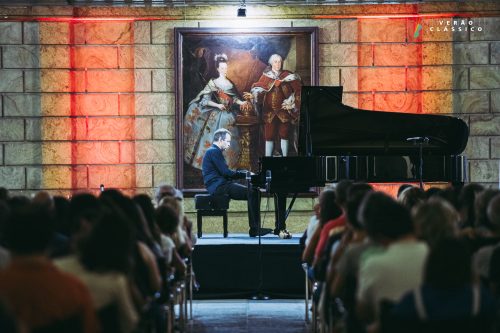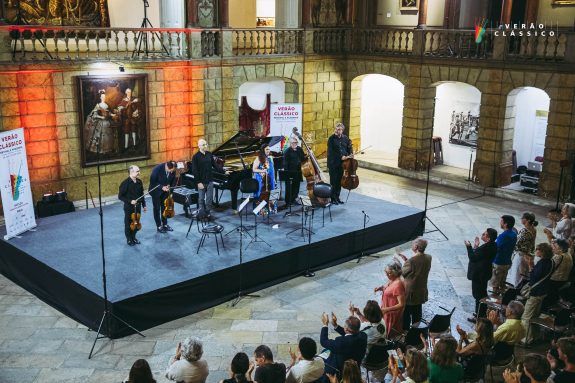 Portugal Verão Clássico Festival 2024 [1] – MasterFest Concert I: Stephan Picard, Eszter Haffner (violins); Miguel da Silva, Eszter Haffner (violas); Patrick Demenga (cello); Janne Saksala (double bass); Geir Draugsvoll (accordion); Eldar Nebolsin, Filipe Pinto-Ribeiro (piano). Museu Nacional dos Coches, Lisbon, 23.7.2024. (LV) [This performance was reviewed from a video provided by Verão Clássico]
Portugal Verão Clássico Festival 2024 [1] – MasterFest Concert I: Stephan Picard, Eszter Haffner (violins); Miguel da Silva, Eszter Haffner (violas); Patrick Demenga (cello); Janne Saksala (double bass); Geir Draugsvoll (accordion); Eldar Nebolsin, Filipe Pinto-Ribeiro (piano). Museu Nacional dos Coches, Lisbon, 23.7.2024. (LV) [This performance was reviewed from a video provided by Verão Clássico]

Dvořák – Bagatelles, Op.47
Robert Schumann – Fantasiestücke, Op.12
Mendelssohn – Piano Sextet, Op.110
For the first of four concerts by faculty members of the tenth Verão Clássico Festival, artistic director Filipe Pinto-Ribeiro programed one of Robert Schumann’s most personal journeys of the heart and surrounded it with an endearing curiosity by Dvořák and one of Mendelssohn’s youthful miracles.
It was Eldar Nebolsin who stole the show with a performance of Schumann’s Fantasiestücke Op.12 that made the simplicity of character and feeling tell. He established the mood with an internal purity in ‘Des Abends’ and navigated the emotional hills and valleys of ‘Aufschwung’ without letting the notes obscure the emotions. After a quietly rapt ‘Warum’, the Uzbek-born virtuoso found unusually affectionate humor in ‘Grillen’ and plunged headlong into the intense amorous adventures of ‘In der Nacht’. He flashed out majestically in ‘Traumes Wirren’ before ending with an ‘Ende vom Lied’ that was deeply consoling and, in the composer’s idiosyncratically ambiguous way, joyful and even triumphant. Indeed, Nebolsin himself seemed increasingly under the music’s spell, and when he finished and had seemingly left nothing at the keyboard, the audience showered him with the warmth of their applause.
The concert started with Dvořák’s five Bagatelles which were originally intended for home performance by four reasonably accomplished string-playing amateurs and one playing the harmonium, a nineteenth-century keyboard relic. Despite its modest origins, the piece contains many of the mature composer’s most beloved touches which has endeared it to record collectors, even though opportunities to hear it live are rare.
One problem is locating a harmonium and, lacking that, finding an adequate substitute. The ideal replacement would simulate the harmonium’s organ-like wheezing that Dvořák drew on for the first and third movements with their reference to bagpipes in the Czech folksong ‘Hrály dudy’. It turns out that the accordion was a perfect substitute. and one can imagine Dvořák’s delight if he had been able to hear the performance by Norwegian virtuoso Geir Draugsvoll who showed a fine balance between providing a discreet background and playing the occasional little solo riffs.

Mendelssohn’s Sextet Op.110, scored unusually for violins, two violas, cello, double bass and piano, is an untroubled and delightful work. And yet it was transformed by Pinto-Ribeiro’s rare abilities: he led with virtuosity and a youthful surge of poetry in every phrase, and still immersed himself in the overall sound. While the complex tawny sound of violists Miguel da Silva and Eszter Haffner, along with the deep warmth of Janne Saksala’s double bass, contributed to a full-bodied performance, they couldn’t disguise the fact that the Sextet is more akin to a miniature piano concerto than traditional chamber music.
In addition to the sheer pleasure of the music making, string-playing students of the Verão Clássico Academia must have gained much from watching their teachers in action in the music by Dvořák and Mendelssohn: how they chose their bowings and fingerings and put together such affectionate performances rich in timbre, dynamics and articulation with only a rehearsal or two.
This opening concert of the Verão Clássico Festival showcased not only the exceptional talents of its faculty but also the rich diversity of the classical repertoire, promising an exciting series ahead.
Laurence Vittes
